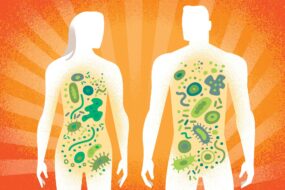
Imagine walking through a dense,vibrant jungle,teeming with life. You can’t see everything, but you can feel the energy adn complexity all around you. Now, what if I told you that there’s a similar ecosystem living inside you, influencing your health, mood, and even your weight? Welcome to the fascinating world of the human microbiome. It’s a story that’s both captivating and complex, involving trillions of microorganisms that call your body home. The surprising question is, how much do you really know about the tiny life forms that live on and inside you, and what they’re doing to your health? Did you know that there are approximately 39 trillion microorganisms living in and on the average human body? That’s roughly the same number of human cells, but with a crucial difference – these microbes are not human. They’re a diverse community of bacteria, viruses, fungi, and other microorganisms that have evolved alongside us, playing a critical role in our overall health and wellbeing.
The human microbiome is like an invisible organ, essential for our survival, yet frequently enough overlooked until something goes wrong. The Human Microbiome Project, launched in 2008, was a groundbreaking initiative that aimed to characterize the microbial communities found at various sites on and within the human body. By analyzing DNA samples from different parts of the body, researchers were able to identify thousands of microbial species, most of which were previously unknown. One of the most notable findings from this research was the realization that the human microbiome is not just a collection of random microorganisms; it’s a highly complex ecosystem that’s intricately linked to our health. for example, the gut microbiome – the community of microbes living in your intestines – plays a critical role in digesting food, producing vitamins, and regulating the immune system. An imbalance in the gut microbiome, also known as dysbiosis, has been linked to a range of health issues, from irritable bowel syndrome and obesity to mental health disorders like depression and anxiety. Some of the key factors that influence the microbiome include:
* Diet: A diet high in processed foods and sugar can lead to an imbalance in the gut microbiome, favoring the growth of pathogenic microbes.
* Lifestyle: Factors like stress, lack of sleep, and physical inactivity can also disrupt the balance of the microbiome.
* Environmental exposures: Exposure to antibiotics, pollution, and other environmental toxins can harm beneficial microbes and promote the growth of pathogenic ones.
The science behind the microbiome is complex, involving a delicate balance between different microbial species and their interactions with the human body. Research has shown that factors like diet, lifestyle, and environmental exposures can substantially impact the composition and function of the microbiome. As a notable example, a diet rich in fiber and polyphenols can promote the growth of beneficial microbes, supporting overall health. The real-life impact of the human microbiome is profound, with far-reaching implications for our health and wellbeing. For example, research has shown that the microbiome plays a critical role in the development of metabolic disorders like obesity and type 2 diabetes. Studies have also linked the microbiome to mental health, with alterations in the gut microbiome observed in individuals with depression and anxiety.
As our understanding of the human microbiome continues to evolve, we’re beginning to uncover new ways to harness its power for better health. Fecal microbiota transplantation, for example, is a promising treatment for certain gastrointestinal disorders, involving the transfer of fecal matter from a healthy donor into the gut of a patient. Probiotics and prebiotics are also gaining popularity, with evidence suggesting that they can definitely help restore balance to the microbiome and promote overall health. The story of the human microbiome is one of complexity and intrigue, with much still to be discovered. As researchers continue to unravel its secrets, we’re gaining a deeper understanding of the intricate relationships between microbes and their human hosts. This knowlege has the potential to revolutionize our approach to health and disease, enabling us to develop new treatments and therapies that target the microbiome.
Some potential benefits of a balanced microbiome include:
| Boosted immune system | A healthy microbiome helps regulate the immune system, preventing infections and diseases. |
| Improved mental health | A balanced microbiome has been linked to reduced symptoms of depression, anxiety, and other mental health disorders. |
| Enhanced digestion | A healthy gut microbiome aids in digestion, preventing issues like bloating, gas, and irritable bowel syndrome. |
| Weight management | An imbalance in the microbiome has been linked to obesity and weight gain, while a balanced microbiome can support weight loss. |
The human microbiome is a fascinating and complex ecosystem that’s essential for our health and wellbeing. By understanding its intricacies and the factors that influence it, we can take steps to promote a balanced microbiome and support overall health.
#HealthFacts #Microbiome #GutHealth #wellnessstory #MedicalMystery #scienceoffitness #InfographicStory #FitnessJourney #HealthTransformation








